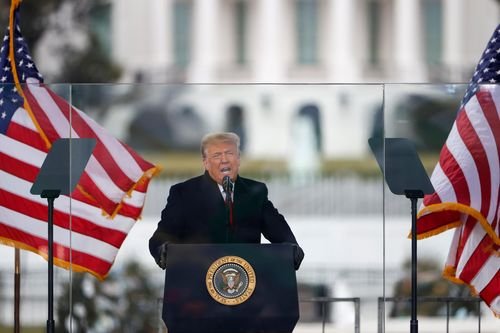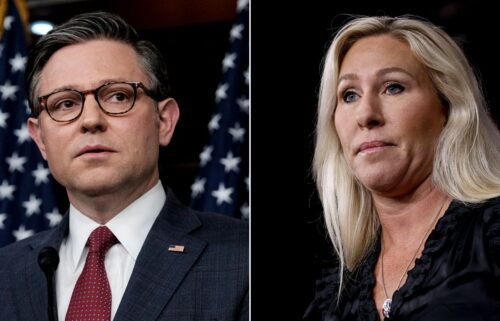Democrats indicate they don’t need Trump’s testimony to make case at impeachment trial

House Democrats prosecuting the case against Donald Trump are signaling privately and publicly they will likely avoid a dramatic showdown with the former President and are unlikely to issue a subpoena compelling his testimony.
Democrats believe there is ample evidence, from video and other sources, showing Trump’s clear intent to incite his supporters to storm the Capitol that led to the deadly January 6 riot — without his testimony. They plan to argue his refusal to testify underscores his guilt. And there is no appetite for a potential court showdown if Trump were to refuse to comply with a Senate subpoena for his testimony — while many Senate Democrats are eager to keep the trial short in order to move onto other business quickly.
All of which, Democratic sources say, means it’s unlikely that the managers will pursue a subpoena for the former President.
“His immediate refusal to testify speaks volumes and plainly establishes an adverse inference supporting his guilt,” Rep. Jamie Raskin, the lead impeachment manager, said Thursday night, while making no mention of issuing a subpoena to compel his testimony.
No final decisions have been made yet on how hard to pursue Trump’s testimony or issue a subpoena, Democratic sources say. Moreover, Democrats are still undecided about calling witnesses to testify, but there is a growing expectation that they won’t seek testimony from anyone in large part because the senators all experienced themselves what happened that day and video evidence will be able to tell the story vividly.
Democrats are still debating how long the trial should last, with impeachment managers eying a proceeding that could take up to two weeks and some Senate Democrats pushing for a shorter timeframe, according to sources familiar with the matter.
It appears increasingly likely that the trial could wrap by the week of February 22, because Democrats are hoping to approve the Covid relief package by the end of the month.
The structure of the trial is still yet unknown, but it is expected to be shorter than Trump’s 2020 trial that lasted about three weeks. Behind the scenes, Senate Majority Leader Chuck Schumer and Senate Minority Leader Mitch McConnell and their aides are engaged in extensive discussions about a package setting the ground rules of the proceedings, which is expected to be unveiled before the trial begins Tuesday, sources say.
The Senate will have to approve the ground rules, which both sides expect will be adopted by a bipartisan majority, a departure from 2020 when the rules package was adopted along party-lines after an acrimonious debate that stretched beyond midnight on the opening day of the trial.
Whether to compel witnesses to testify is a call that senators will ultimately have to make, since a simple majority of senators could issue a subpoena for testimony. But some Democrats are leery of seeking Trump’s testimony, arguing it’s not needed and could turn into a sideshow.
“I think it’s a terrible idea,” Sen. Chris Coons, a Delaware Democrat, said Thursday. Asked to explain why, Coons responded, “Have you met President Trump?”
Senate Democrats are cognizant of the fact there appears to be little chance of a conviction, which requires a two-thirds vote. To reach that threshold, 17 GOP senators would have to find Trump guilty, but 45 of the 50 Senate Republicans supported a procedural vote last week to dismiss the trial on the basis that it’s unconstitutional to convict a former president.
Despite facing a skeptical jury in the Senate, House Democrats plan to argue that Trump was singularly responsible for inciting the deadly January 6 riots, after his lies and conspiracy theories that the election was stolen whipped up his supporters to try to violently stop Congress from certifying President Joe Biden’s election victory. The impeachment managers plan to use video evidence to show how Trump’s speech motivated the rioters, and how they declared they were acting on Trump’s behalf as they ransacked the Capitol.
But by requesting Trump’s testimony, even if they’re unsuccessful, Democrats are blunting a potential argument from Trump’s defense team that the House moved so quickly to impeach Trump a second time they didn’t even seek witnesses.
In Trump’s first impeachment trial, Democrats sought to authorize a subpoena for former Trump national security adviser John Bolton to testify, which failed in a contentious Senate vote. This time, Democrats control the Senate, meaning they would have the votes to authorize a subpoena. But taking that step could open up the trial to thorny legal issues that end up in court — and delay the trial even further.
The Trump administration laid the groundwork to take a subpoena to court, fighting nearly every request in House probes in court over the last several years. That includes a case that’s still being litigated and has blocked his former White House counsel Don McGahn from testifying to Congress for nearly two years.
Trump has repeatedly tried to claim “absolute immunity” for himself and for his top former advisers, even while courts signal that approach is too broad to be allowed. During Trump’s first impeachment proceeding, the administration ignored several subpoenas of witnesses and documents from the administration.
When under more personal investigation, Trump, using private attorneys, tied up in courts several attempts to obtain his and his business’ tax information. Like the McGahn case, that litigation is still unresolved.


